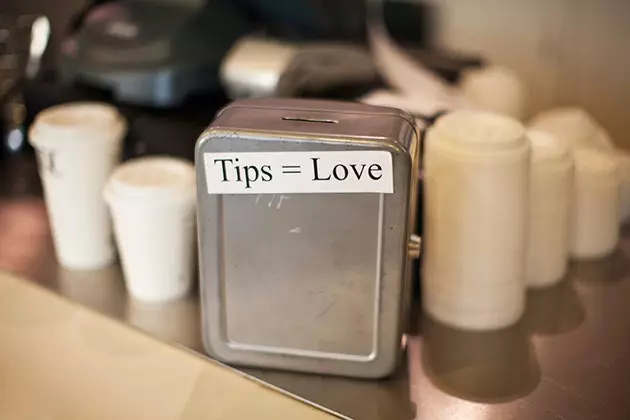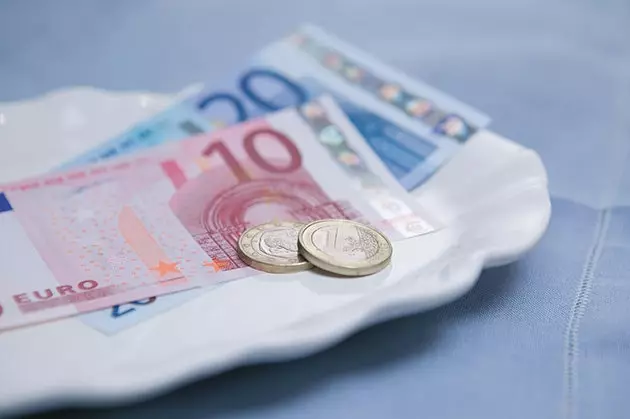
Do I tip or not? And if I leave, how much do I leave? How do I leave it? Do I give it to the waiter or is it enough that it stays on the table?
It happens when we go out to dinner in Spain but the story gets even more complicated in our trips abroad. We review country by country so you don't fail (if you don't want to).
Because as much as the RAE defines the tip as a "treat that is above the price and as a sign of satisfaction given for some service", the truth is that many times this ceases to be voluntary and becomes an obligation, moral or even legal.
Although on other occasions just the opposite happens, leaving it is a sign of rudeness and exceeding it, as Taylor Swift did in Romania, is not well seen either.
To avoid screwing up by being generous or stingy, the best thing is to strictly follow the motto 'wherever you go, do what you see' and adapt to the customs of each country.
Apps like Crewulator for iPhone or Global Tipping make it easy. The guide _Tips on tipping (A global guide to gratuity etiquette) _ published in 2011 by journalists Carole French and Reg Butler based on a survey carried out by the portal infobae.com, may also be useful to you.
The case is not to fail in this convoluted world and that, if one day you become famous, no waiter can expose you as Katherine Taylor did with Madonna, Tobey Maguire and Gwyneth Paltrow in her novel ' Rules for Saying Goodbye '.
At Condé Nast Traveler we have classified the countries according to the importance they give to this tricky issue. From the sites that reject it to the places where it is almost an obligation.

tip = love
HIGHLY NOT RECOMMENDED: IT IS NOT VIEWED
- Japan. Don't even think about leaving it, the waiter may take it as an insult and feel offended. This does not mean that you will not have impeccable service. So if you want to thank him, just say ' gochisōsama deshita ' (thanks for the food) when paying the bill.
- China. If you do not want to be chased down the street to return your money, it is better not to leave a tip. It is something unusual and somewhat offensive, since it can be interpreted as a form of underestimate the work of the waiter . Even so, the custom has begun to take root in the westernmost areas and in Hong Kong and Macao it is considered a sign of etiquette.
- Paraguay. The book _Tips on tipping (a global guide to gratuity etiquette) _ warns against leaving it. In this country it has a negative connotation and can sometimes be considered a bribe.
- Singapore. When in doubt, it is better not to leave it. Traditionally it has been prohibited by law and frowned upon, although the truth is that tourism is introducing the custom in some restaurants in the country. The best thing in any case is not to risk it.

Doubts with tips
UNNECESSARY: NOT EXPECTED OR NEEDED
- Greece. It is a rare case in Europe because the Greeks include the tip (15 percent) in the bill by law. If you are very satisfied, you can increase it by 5 to 10 percent. Just leave it on the table.
- Australia and New Zealand. It is something totally optional since both countries the salaries in this country are high. If you still want to leave it, take note: in Australia it is 10% of the account, while in New Zealand it must be between 5 and 10 percent.
- Iceland, Denmark and Finland. The tip is included in the bill and no waiter expects it, although they are not offended if they are given. It should be between 5-10 percent of the bill.
- Norway. Tipping is never expected and is much more voluntary and discretionary than in other EU countries. Usually 10 percent is left. - Indonesia The extra payment is included in the bill which makes any gratuity unnecessary. If you're feeling generous, it should be between 5-10 percent.

Avoid bad faces
RECOMMENDED: there is no obligation, but they expect it
- Germany. The important thing here is not how much (between 5 and 10 percent of the total price) but how. You can't leave it on the table, you have to give it to the waiter. The trick is to pay with a bill larger than the full price and say 'Stimmt so' ( 'keep the change'). If you pay by card, you must announce how much you want to pay: 'Ich bitte möchte zahlen' ('Please, I want you to pay...') .
- Holland, Italy and Portugal. In these countries it happens as in Spain: it is not mandatory and there is no formula to calculate the figure. There is a tendency to rounding up and it is enough to leave a few coins on the table. In the case of the Netherlands, the account includes an additional charge of 15 percent for service.
- Hungary. Watch out! here the tip should never be left on the table , you have to give it to the waiter. First check that the account does not include a 'service price'. If not, let it be between 10 and 15% of the total.
- France. Although it is usually included, it is always completed with 10 percent. In cases where this service is not charged, it rises to 15 percent. The normal thing is to leave it on the table, but if the restaurant is very full it pays to do it by hand and tell the waiter: "c'est bon."
- Russia and Ukraine. Banned during the communist regime, the creation of the CIS (Commonwealth of Independent States) has made them popular in its 11 member states. It should be between 5 and 10 percent of the total bill.
- Romania. Don't make the same mistake as Taylor Swift, who paid $500 to complete an $800 bill, just give 10 percent.
- Austria, Poland and Sweden. The bill already includes an extra payment as a tip, although waiters are used to receiving 10 percent more for their services.
- Turkey. It is an institution. In normal restaurants it is enough that it is 10-15 percent of the bill and if it is luxury, it is better to apply 20 percent. It is recommended to give it in your hand if we do not want the owner of the premises to keep it.
- Thailand and the Philippines. The natives do not have to pay it but if you are a tourist (as would be your case) they expect you to do so. The best thing is that it is 10 percent.
- Egypt, Morocco, South Africa and Tunisia. They are the only countries in Africa where tipping is customary, according to Michael Starbuck in his book A Comparative Study of Tipping Practices and Attitudes. There is no fixed rule, although 10-15 percent claim not to fail.
- Brazil. The account already includes a payment of 10 percent as a 'serviço' although the waiters have become accustomed to receiving an extra 10%. It happens especially in tourist areas.
- Argentina, Chile and Uruguay. It is expected that approximately 10% extra will be left. In the case of Uruguay, not giving it is synonymous with being stingy and unpleasant.
NECESSARY: SAVE YOURSELF A FACE
- United Kingdom. Before starting to make calculations, check the bill well, because in the United Kingdom they usually charge the tip under the heading 'service included'. It is not compulsory, so if you do not want to pay it, you can ask for it to be canceled at the risk of getting a bad face. If you think they deserve more (10-15 percent) just say so. If you pay by card, specify it well: if not, it will be the waiter who will put what he wants.
- Mexico. Although it is not a law or obligation, it is in very bad taste not to leave it . It is only understood if the service has committed a serious fault that you should notify the manager. It is usually between 10 and 15 percent and serves to complete the quite low salaries. If you don't want to leave it, you can rest easy: the Federal Consumer Protection Law (LFPC) supports you.
- Cuba . If you don't usually tip, in Cuba you will have to change the custom. On this island it has gone from being prohibited to being a kind of norm. In restaurants it is 10 percent.
PSEUDOOBLIGORY: NECESSARY TO COMPLETE SALARIES
- USA. Here there is no doubt. More than custom, it is a norm because the tip represents a good part of the salary of the waiters and it shows in the treatment that the client receives. There are restaurants (California and Florida) that already include it in the bill and in others they suggest how much to leave, otherwise it is normal for it to be between 15 percent and up to 20 percent of the account value . If you don't let her, you risk being chased down the street.
- Canada. It happens as in the United States: the salary of the waiters depends in part on these bonuses that must be between 10 and 15 percent. It is recommended to give it in cash.
- India. It is not compulsory but it is expected as it is an important part of the income of the waiters. You can give it in hand or leave it on the table, it is advisable that it be 10 percent of the total price of the bill.
- Czech Republic. There is a moral obligation to leave it (5-15 percent) since it completes the waiter's salary, although before doing so, check the bill carefully because sometimes it is included. In small places, give it to the waiter to prevent anyone from taking it.

In the United States, between 15 and 20 percent is expected.
*This article was originally published on November 14, 2015 and updated on July 5, 2018.
